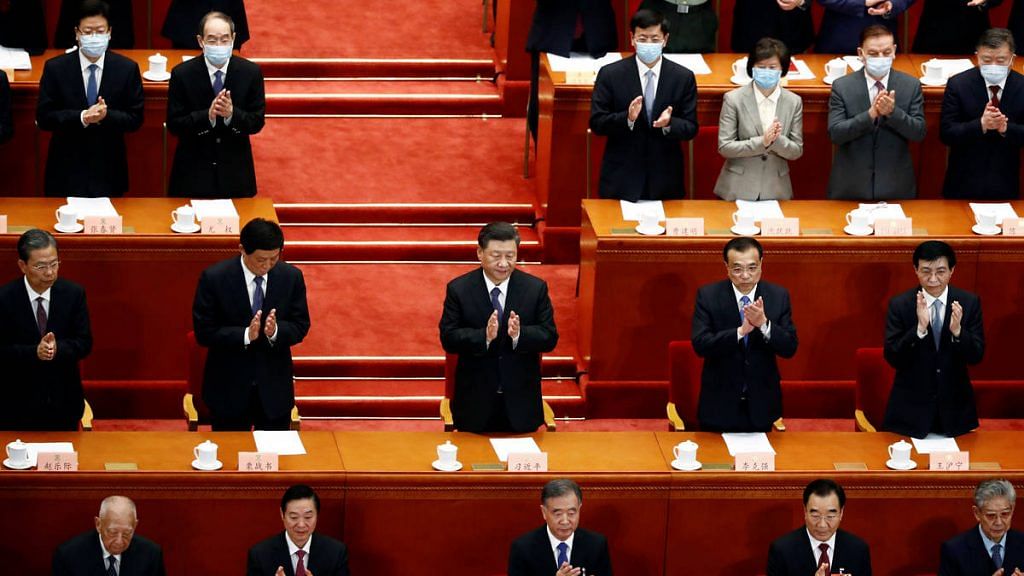The Chinese propaganda machinery is led by its mouthpiece Global Times, known for spreading fake news and damaging adversaries’ credentials. The newspaper recently published an article titled ‘Be wary of India’s provocation amid worsening pandemic’, according to which, India may attempt to “initiate provocation along its borders with China or Pakistan, fanning nationalist sentiments at home to distract people’s attention.”
Nothing could be further from the truth.
The article accused India of mismanaging the pandemic and advised the Indian government to approach China for assistance. This was repeated by the Chinese foreign ministry spokesperson, Wang Wenbin, when he stated: “The Chinese side notes that the epidemic situation in India is severe and there is a temporary shortage of epidemic prevention and medical supplies. We are ready to provide necessary support and assistance to India so that they can control the epidemic.”
Also read: Army wants around 350 light tanks to sharpen its mountain warfare edge amid Ladakh stalemate
India’s Covid response
There is no doubt that the second wave of the Coronavirus has hit India hard. The Narendra Modi government and the states are working overtime to ensure that the virus is contained. Medical facilities are stretched to the limit. India is seeking to import vaccines and oxygen but evidently, nothing will be procured from China. For India, the world would stand by as it supported all nations when it could, and it does not need Chinese support. Although India was among the first nations that responded to China’s call for help when the virus first broke out. New Delhi dispatched tonnes of medical aid and needed equipment.
In gratitude, India faced Chinese intrusions in Ladakh. And to cover its fake reports on Covid casualties, the Chinese Communist Party’s brutality on the populace, and to suppress the true nature of the virus’ spread, China launched the wolf-warrior diplomacy, attempting to threaten and subdue nations that asked for a probe into the origins of the coronavirus. It bulldozed the World Health Organization into ensuring that its name is not linked to the virus.
Taking advantage of nations battling the pandemic, Beijing began expanding its conflict in the South China Sea, seeking to grab territories of smaller nations involved in containing the pandemic unleashed from its own Wuhan laboratory. China blocked medical supplies to the countries that questioned its lies and sold the same stores, which it received as gifts, when it was struggling to contain the pandemic. This resulted in the global community coming together to shift essential medical supply chains away from China. China exploited the virus to enhance its power while others stepped forward to support nations in need.
Unlike the Chinese offensive against even smaller neighbours like Bhutan and Nepal, India has never sought expansion of territory. It is to counter these premeditated offensive actions of China that the global community has begun uniting. The rise of the Quad and global interest in the Indo-Pacific is a case in point. China has exploited economically weaker nations battling the pandemic rather than displaying generosity and supporting them. It demanded that such countries also contribute to its medical research in case they desired Chinese vaccines while India offered its vaccines as a global service to humanity.
China stooped low insisting that those entering the country must be vaccinated with its poor quality vaccine, knowing that it has no takers. Sinovac is 50 per cent efficient and is yet to receive a WHO listing. When threatened by similar demands for those travelling from China, it was compelled to back down. During the pandemic, China made more enemies while India gained global recognition and support for its humane approach.
India has been seeking peace and tranquillity along all its borders. It has never sought hostility but development and better bilateral ties. During these testing times, India and Pakistan accepted a ceasefire along the LoC, bringing years of firing to an end and providing much needed relief to people on both sides. This may be the first step towards resolving the India-Pakistan dispute. Despite hiccups and unthoughtful comments by the Pakistani political leadership, who have no say on Pakistan’s India policy, the ceasefire holds and would possibly continue because it has the backing of the Pakistan army.
Also read: Why India opted for a ‘stand-alone’ agreement with China in Ladakh
Behind the disengagement delay
China is continuing to enhance tensions along the Line of Actual Control (LAC) by refusing to further disengage while simultaneously seeking restoration of normal ties. Indian forces, which gave the Chinese forces a brutal lesson in Galwan and showed tactical acumen by occupation of the Kailash Range, remain in place and will ensure that any action by China is repulsed with vigour. India, forcing a stalemate and pushing the Chinese onto the negotiating table, has hit the global reputation of the People’s Liberation Army. There is no doubt that China is finding it hard to justify intrusion along the LAC when it is being compelled to pull back. Hence, it is delaying further withdrawal only as a face-saving measure.
India’s refusal to move forward on normalisation of bilateral ties and accept Chinese investments has hurt Beijing’s ego. Every Chinese diplomat, including its ambassador in India and the foreign minister, has been pressing for restoration of ties, but India stays adamant. This explains the spread of fake news reports in the Chinese media.
The world knows that India seeks peace and has never exploited an internal crisis. On the contrary, China has ducked global questioning and the brutal suppression of Covid cases by its wolf-warrior diplomacy — aggressive actions in South China Sea, LAC incursions and a hostile stance towards the smaller neighbours such as Bhutan and Nepal. The world standing by India while questioning Chinese aggressiveness is indicative of the truth. Global Times must look inwards and seek to lecture its own leadership, rather than point fingers at India.
Maj Gen (retd) Harsha Kakar is strategic analyst and columnist. Views are personal.
Edited by Anurag Chaubey
